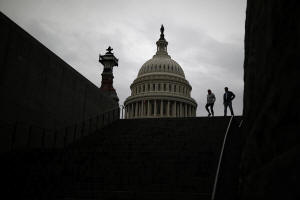US Congress' wild 2023: McCarthy and Santos ousted; flirtation with
economic disaster
 Send a link to a friend
Send a link to a friend
 [December 27, 2023]
By Richard Cowan [December 27, 2023]
By Richard Cowan
WASHINGTON (Reuters) - There was plenty of sound and fury this year in
the U.S. Congress, but scant legislating amid Republican infighting in
the House of Representatives, leaving little time for pressing matters
such as funding the government and continuing to aid Ukraine in its war
against Russia.
Congress will return for its 2024 legislative session on Jan. 8.
Lawmakers will be confronted with Jan. 19 and Feb. 2 deadlines for
settling government spending through September. They also hope to pass
emergency aid for Ukraine and Israel, possibly with unrelated U.S.
border security provisions attached.
Failure to approve the one-dozen fiscal 2024 spending bills would plunge
Washington agencies into shutdown mode.
With the November presidential and congressional elections now looming,
Congress could see yet another year of struggles, especially if
Republican chaos in the deeply-divided House continues.
Three history-making developments defined Congress in 2023:

A record 15 ballots were required before Republicans managed to elect
Representative Kevin McCarthy as speaker of the House; within nine
months a group of right-wing conservatives made him the first speaker in
history to be removed from office and it took three weeks to anoint a
new one; and two months later, Republican Representative George Santos
became the first member to be expelled from the House who had not been
convicted of a crime or fought for the Confederacy during the U.S. Civil
War.
The result was that for more than the equivalent of a full month the
House was unable to work on any legislation as the chamber fought to
tamp down Republican anarchy.
As revolts by right-wing Republicans roiled the House, the Senate was
comparatively tame, working across party lines to write one dozen 2024
spending bills -- none of which have yet made it into law in any form --
and trying to confirm as many of Democratic President Joe Biden's
judicial nominees as possible as he enters the final year of his first
term in office.
DISASTERS AVERTED
Amid the House ruckus, lawmakers narrowly avoided a couple of disasters.
They sidestepped triggering an historic default on U.S. debt in June
with a deal that made minor budget savings. It promptly was thrown into
controversy as right-wing House Republicans refused to adhere to the
top-line spending authorized by the deal. And, despite two close brushes
in October and November, there were no government shutdowns, as stop-gap
federal funding bills kept U.S. agencies running on fumes.
[to top of second column]
|

Pedestrians walk along the East Front of the U.S. Capitol Building
on Capitol Hill in Washington, U.S., December 4, 2020. REUTERS/Tom
Brenner/File Photo

In one important legislative victory, a defense policy bill was
enacted into law, authorizing a record $886 billion in annual
military spending.
The relatively unproductive year was in contrast to 2022, when the
Democratic-controlled Congress passed a major infrastructure
investment law, record investments to fight climate change and lower
prescription drug prices and the first major new gun controls in
decades.
Last year may have been light on lawmaking, but it had no shortage
of colorful personalities.
Congressional Democrats privately worried about Biden's age (81) as
he gears up for re-election; Senate Republicans fretted their
leader, Mitch McConnell (81), may not be up to the job, especially
after two episodes in which he froze in front of cameras, stirring
worries about his health.
Democrat Joe Manchin announced he will not run for re-election in
his solidly-Republican home state of West Virginia. But he refused
to quiet speculation he might run as an independent presidential
candidate.
His exit put a dent in Democrats' drive to keep their Senate
majority in November's elections.
The House authorized an impeachment probe of Biden, even though
Republican investigators have not unveiled firm evidence of
presidential wrongdoing; Republican Representative Marjorie Taylor
Greene used a congressional hearing to show graphic images of what
she said was Biden's son, Hunter.
Meanwhile, three House Democrats were censured: Adam Schiff for
investigating Trump's conduct as president; Jamaal Bowman for
pulling a fire alarm in a House office building when there was no
fire; and Rashida Tlaib, a Palestinian-American, for comments she
made regarding Israel's war with Hamas.
When elected speaker, McCarthy triumphantly said: "It's time for us
to be a check and provide some balance to the president's policies."
Instead, McCarthy is checking out of Congress on Dec. 31.
(Reporting by Richard Cowan; Editing by Don Durfee and Daniel
Wallis)
[© 2023 Thomson Reuters. All rights
reserved.]This material
may not be published, broadcast, rewritten or redistributed.
Thompson Reuters is solely responsible for this content.
 |